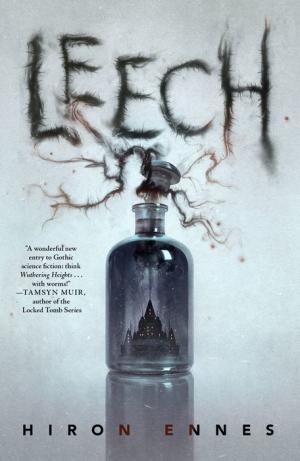Welcome back to Reading the Weird, in which we get girl cooties all over weird fiction, cosmic horror, and Lovecraftiana—from its historical roots through its most recent branches.
This week, we cover Sonya Taaffe’s “As the Tide Came Flowing In,” first published in Taaffe’s 2022 collection of the same title. Spoilers ahead, but well worth your read!
“Her dreams were full of monstrous things, half-transparent skin stretched over half-luminous bones, cold blood in colder dark.”
Elizabeth Bridgman McKay died in springtime. So young, the Bridgmans of Boston mourned, and so soon after her husband’s tragedy. Never strong, she’d married unwisely, choosing Ezra McKay, a whaleman who’d sailed two days after their wedding. No wonder loneliness drove her to another man, but she’s dead now and her bastard, too. The Bridgmans say little about Elizabeth at her funeral, and her name is absent from the family plot.
***
Elizabeth Bridgman McKay is nearly sixty in springtime, more than thirty of those years spent in the Danvers Lunatic Hospital. These days most patients have nightmares about mortar-shells, not seashells. The nurses say our brave boys are fighting for us. Elizabeth is fighting, too, for silence or just solitude. Though inland, she’s never without the sea.
***
Ezra came home on a summer night, calling under her window so softly she thought she was dreaming. She opened the door to a “face like a figurehead’s, smiling through salt ruin.” When her candle’s light replaced the moonlight, she saw instead her young husband, crooked grin and tousled-barley hair…
He’d courted her with sailor’s treasure pulled from his pockets, and promised that when he had his own ship, Lizzie would sail with him—she’d be his navigator, for she had the steadiest eye he knew. She’d waited one voyage—two years—for him; disowned by her family, she’d wed him in a seaman’s chapel. She’d been jealous of women in other ports, but whenever he returned home “he did not touch her as something fragile or dutiful or rare but as if the knowledge of her body, along with stars, spouts, and card-sharping, were something he carried for everyday employment.” He’d done well for a whaleman, enough to buy her a small house with a cove view. Could she complain of his long absences? Penelope, after all, waited ten years for Ulysses…
In bed Ezra told Elizabeth he’d come back from Hell for her. She went cold. “Because I am safe,” she said. “Elizabeth,” he said. “You’re not safe.” She laughed, the desolation of the moment before leaving her, and they made love, and she “fell into sleep like a clear black current.”
She woke believing she’d merely dreamed their reunion. But she saw what was “strewn through the sheets like storm-wrack in the unmistakable morning light, and then she began to scream.”
***
The child came in winter, while the Danvers nurses held her down. They kept telling her Ezra was dead, as if she hadn’t heard that already while six months pregnant. Freshly disembarked from the Galatea, Ezra’s shipmate Vieira told her how Ezra harpooned a bowhead whale, how it smashed the boat, how Ezra never resurfaced from the icy sea.
She fainted at the news, and her six-month’s secret was revealed. Her father railed against her, while her mother wept “as softly as a knife.” Elizabeth kept explaining that the child was her husband’s, but it was impossible.
Later the nurses would tell her she’d tried to wring her baby’s neck. But all she’d seen when they tried to put it in her arms was a mess of shells and seaweed, like what she’d found in her bed nine months before. The child was below the Arctic ice with his father. For one summer night she let the sea in; now she could never be free from it.
***
Ezra comes back in rain-dripping autumn, hair mossy with algae, voice hissing like the tide. In her madwoman’s bed, Elizabeth knows her loving husband would never come back to her like this. This thing is a dream, or the cheating sea itself.
Buy the Book


Leech
She turns up the gaslight, and he looks alive again. He draws a rocker to the bedside, and Elizabeth doesn’t know anymore “if she was dead or dreaming or he was, if the sea, unbelievably, had not cheated her after all.” They spar about his tardiness. Where he was, he says, there was no ship’s chronometer. But now: “The tide turned, Lizzie. The heart’s tide. You.”
She isn’t having it. He left her worse than a widow. In the warm gaslight, Ezra is a living man. In “the colder edging of the moonlight,” she sees again “the barnacle crust like a fouled hull.” Does he think the tide could bring a son to him?
No, only Elizabeth, he says. Before she can speak, he begins pulling sea-treasure from his pockets. She feels its weight compressing her mattress. “Will there be a ship, Ezra?” she asks. “Will there be a ship for me?”
His gaslit face young, Ezra replies, “I’ll wait.”
And “I’ll hold you to that,” Elizabeth says. She sleeps, not knowing if she’ll wake at Danvers or leave behind a mess of pearls.
What’s Cyclopean: In the asylum, Lizzie’s forbidden all oceanic metaphors. Her hair cannot be “a beach of grey sand,” nor clouds “white whales’ bellies” shoaling in a sky “the hungry, reflecting blue of the water she did not need to see.”
The Degenerate Dutch: Lizzie’s parents are almost as angry that she married out of her class, or married an Irishman, as that she ostensibly cheated on him. But the child who cannot be Ezra’s pushes them to “invocations of whoredom and disease”.
Weirdbuilding: Lizzie seems the living version of the ghostwife wailing on the shore, waiting for a sailor who never comes home. Alive, she “haunts the shore, praying for her courses, scrubbing the floor with sand”. Ezra, meanwhile, builds (barnacle-like) on the trope of the spirit that visits at the moment of death, only discovered later to be an apparition.
Libronomicon: Lizzie thinks of the Odyssey and Penelope waiting for her husband, and of the myth of Cupid and Psyche.
Madness Takes Its Toll: Lizzie’s madness is the sort that comes with having experiences most people don’t believe, and refusing to act otherwise. She thinks of herself as not “correctly insane like her wardmates with their starvations and compulsions, their manias and melancholias.” But her madness also the sort that comes with being given no sensible way to respond to her experiences—perhaps not so different from the traumatized World War I vets that eventually join her at Danvers State.
Anne’s Commentary
I considered summarizing Taaffe’s novelette as a campfire tale the narrator would swear was true, the better to induce listener shivers. But that approach wouldn’t have done for a precis meant to give a sense not only of the story’s plot but of its style and complex salt-savor.
Having attempted that justice for “As the Tide,” I’ll have a go after all at the campfire version:
“Back in Victorian times in Boston, there was this rich girl who fell in love with this sailor, a whaleman. Her family disowned her when she married him, so she lived alone in a cottage by the sea while her husband was gone for, like, two years at a time! One voyage, he came back at night, calling under her window. She let him in, and they right away went to bed. One thing funny was how she hadn’t heard his ship was back, but he just said he’d come from Hell to be with her. Next morning she woke up alone and figured he’d been a dream, but then she saw all this seaweed and shells in the bed!
“Before long she realized she was pregnant. When her husband’s ship docked, they told her he drowned when a whale busted up his boat, and they never found his body. Of course, nobody believed the baby was her husband’s, and her parents stuck her in this asylum. She had the baby there; thinking it was just a bunch of shells and mud, she tried to strangle it. I don’t know if she killed it or not, but she stayed in that asylum, hoping her husband would come again. And finally one night he did, but when the moon shone on him, she could see he was dead and all encrusted with barnacles and seaweed and crap, so I guess she went crazier than ever. Or maybe she died, too?
“Anyhow, he left presents on her bed, like sailors bring back from the sea, so he really had been there!”
Ooh, scary, very scary, right? Or have I managed to take all the punch out of the story? I guess its effect would largely depend on how close the campers were to the sea, whether they could hear the soughing of waves on the sand and smell salty decay and imagine dragging footsteps crunching through the piled tide-wrack.
All the weird stories have been told before, yet all the weird stories remain to be told.
What? Didn’t I just admit that by reducing “As the Tide” to its root plot I’d revealed its lack of originality? Its skeleton’s as old as the Pyramids, that tired revenant schtick. Let it crumble into dust and blow away, already. But here’s one thing, the old storyline that is strong does not crumble, not while the deep-psyche fears and hopes from which it emerged remain essentially unchanged, essentially human, essentially us. Here’s another thing. The Devil is in the details, or God is, or both. The point of the adage being that it’s a story’s details, its specifics, that have the power to animate the old bones. Details enrobe the skeletal narrative in flesh that can soothe or allure, or that can leave the skeleton bare, sharp-spurred to grieve or terrify.
Details make the story real, or to nuance the statement, they make the story true.
My pettest literary peeve is fiction without detail, fiction that seems to suppose that leaving everything vague or generic gives it universal appeal. Characters and places have no names. Settings have no color, no texture, no grit or silk, no clamor or the rich stillness that isn’t silence, no stink or perfume, no sour or bitter or salt or sweet.
Taaffe gives us the opposite of vague and generic. The blissfully extreme opposite. You don’t need the first half of her chapbook to tell you she’s a poet, and a superb one. Right from paragraph one: Ezra doesn’t send Elizabeth gifts, or even “exotic gifts”—he sends her “Chinese lacquer and Polynesian boar’s teeth.” Elizabeth isn’t just “childless,” she’s lacking “the solace…of the warmth of a child.” On the day of her fake funeral, willows are “yellowing like old paper” and bronze statues are “tarnished with mist.” Solitary in summer, Elizabeth picks “serviceberries from their windbent bushes” and shells “sweet peas with her feet bare in the sandy earth.” Nor are emotions left abstract: Elizabeth’s jealousy of the other women Ezra may meet abroad is “a clawing, self-sick thing.” Her father accuses her of fornication in preacher-like “invocations of whoredom and disease,” while her mother sits “weeping as softly as a knife.” As a knife! Who do you think cuts Elizabeth the deeper?
If I cataloged all Taaffe’s triumphs of specificity in this story, I’d fill the space of another blog. And I haven’t even started on the challenging but rewarding structure of the piece! I’ve space enough only to say I admire Taaffe as Elizabeth fears Ezra’s maybe-amours among the Hawaiian women, because she is “as strong in the water [of story-telling] as sun-backed dolphins.”
Ruthanna’s Commentary
In “All Our Salt-Bottled Hearts,” Taaffe has a Deep One’s human lover “gone willingly to a bride-bed of rock-weed and clamshells,” bearing “her much-wanted sea-child in a haze of antipsychotics, already dissociating at the smells of salt and blood”. Lizzie has no such luck: her sea-child’s unwanted, his father ambiguous, and no batrachian community around to provide almost-comforting context.
And with her family convinced that the kid’s a product of purely mundane adultery, no chance for answers within the bounds of the story, either. Perhaps an ordinary human child’s been anonymously adopted out, or perhaps the child of a dead man—or of the ocean itself—will have to find his own unexpectedly-aquatic answers later.
The stories may differ, but I want to dive into both of them just the same, breathe language even if I can’t breathe the water. This one’s darker, though, or differently-dark: the yearning for the sea is far more ambiguous. The repulsion side of attraction/repulsion’s made worse by the sea being Ezra’s killer, or at least the power that transforms him in death into something other than the man Lizzie loved.
Attraction’s still there, though. Lizzie wishes for her blood to run down to the sea, to stay closer to shore so that Ezra can find her. It’s a contagion of sorts—“the sea could steal through his longing into hers, worse than any indecent disease.” Ezra didn’t want a shorebound wife: he wanted her to go to sea with him, to share in his wanderlust. She’s never sure, after his death, whether she’s desired now by man or ocean. And still she does, at the end, ask—not for him to stay with her—but if there will be a ship.
There’s not only attraction and repulsion there, but rage, and that changes the calculus. She’s furious at how her experiences, how her desires are treated by the sane world of the land. Or perhaps at how Ezra’s dead-dreaming desires have shaped her life. If he hadn’t needed to visit her again, she would simply have mourned and moved on. She wonders “if a satellite had ever disowned its ocean,” wishing to stop drawing Ezra to herself—and it’s not clearly a shared ship that she asks about, at the end. It’s a ship for her.
Speaking of ships, Ezra’s is the Galatea, an interesting name. Galatea’s not a natural lover, but a sculpted one. So is Ezra, dead and built of sea-stuff, her imagination’s sculpture, or the ocean’s? Was his desire enough to make the sea itself use his corpse as a model?
Lizzie’s prone to mythologizing their relationship, so perhaps it’s no surprise it grows mythic. She thinks his first ghostly visit a reversed Cupid and Psyche, “unmasking himself and all the tragedy over before it began,” but he is masked and the tragedy is just begun. And she thinks of the Odyssey, Penelope waiting ten years (when she’ll eventually wait far longer).
All this ambiguity, all the different interpretations of reality swirling around her. And in the meantime the world moves on, from the age of whaling to World War I. The asylum fills up with PTSD patients, a new era of trauma. A new set of people who have to reconcile different realities, and aren’t given an acceptable way to do so. Moonlight meets gaslight, flesh on one side of vision and sea-wrack on the other. We never do find out which to believe—and Lizzie may not find out either.
Next week, we continue N. K. Jemisin’s The City We Became with Chapter 10: Make Staten Island Grate Again(st São Paulo).
Ruthanna Emrys’s A Half-Built Garden is now out! She is also the author of the Innsmouth Legacy series, including Winter Tide and Deep Roots. You can find some of her fiction, weird and otherwise, on Tor.com, most recently “The Word of Flesh and Soul.” Ruthanna is online on Twitter and Patreon, and offline in a mysterious manor house with her large, chaotic, multi-species household outside Washington DC.
Anne M. Pillsworth’s short story “The Madonna of the Abattoir” appears on Tor.com. Her young adult Mythos novel, Summoned, is available from Tor Teen along with sequel Fathomless. She lives in Edgewood, a Victorian trolley car suburb of Providence, Rhode Island, uncomfortably near Joseph Curwen’s underground laboratory.














